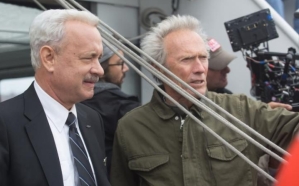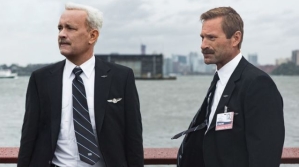Screenwriter Todd Komarnicki - the man behind the script for the soon-to-release Clint Eastwood flick "Sully" - has revealed how prayer guided him as he penned the riveting story of "The Miracle on the Hudson" and why he wants audiences to ask themselves, "What's my Sully moment?"
Adapted from the book Highest Duty, "Sully" recreates the well-known historical event of how Capt. Chesley Sullenberger (brilliantly played by Tom Hanks) and First Officer Jeff Skiles (Aaron Eckhart) safely landed in the Hudson River, in 2009, after losing both jets in a bird strike. The miraculous landing saved the lives of all 155 passengers and crew, and both Sullenberger and Skiles were lauded across the country as a real-life action heros.
However, the story didn't end there. Behind the scenes, the National Transportation Safety Board (NTSB) launched an investigation following the incident, convinced the plane could have landed safely at a nearby airport thanks to a few too-perfect computer simulations. Meanwhile, Sullenberger is faced with severe PTSD and feelings of self-doubt; in the opening scene, he wakes up in a cold sweat after experiencing a vivid dream in which his plane nosedives into a giant New York City skyscraper, bursting into flames.
Ultimately, the NTSB is forced to admit Sullenberger did, in fact, guide the plane to the height of his ability after he urges them to consider the "human element" - real-life people making decisions under severe stress and unprecedented circumstances, not computer simulations.
While the film closes with Sullenberger as a national hero, he maintains a humble demeanor, refusing to take credit for the miraculous event: "We all did it, we all survived," he tells the NTSB, referencing his co-pilot, flight crew, and passengers.

During an exclusive interview with The Gospel Herald, Komarnicki, an outspoken Christian, shared how he prayed for God's blessing before penning the script: "My faith is the central thing to my existence, it's why I'm alive," he said. "I'm very steeped in prayer. I pray throughout the day, and I pray before I write, I pray while I write. It's all part of the same piece for me."
Komarnicki, who is also behind films like "Elf" and "Perfect Stranger," said he was particularly struck by how the "Miracle on the Hudson" is a perfect example of how God uses people to carry out his plans - even when they are completely unaware.
"God is constantly working in our lives, and most of the time we don't notice that His invisible hand is ever present," he said. "He works through people. He didn't reach into the cockpit and land that plane; Sully landed that plane, and next to him was his co-pilot. The brave passengers got off the plane, and the flight attendants and crew were amazing, and the rescue workers that came - physical human beings raced to rescue to pull this off. It's the Miracle on the Hudson, and it's an act of wonder and grace."
In his opinion, Sullenberger is an example of humanity at its best: heroic, grounded, thoughtful, and dedicated to helping humanity. He expressed that audiences will walk away from the film asking themselves, "What's my Sully moment?"
"Look around the world and see emergencies everywhere; we've got refugee crises, we've got homeless situations, we've got people suffering everywhere," he said. "How can I run to that emergency in the same way these first responders did and handle difficult and seemingly impossible odds with the calmness of grace of Sully and his co-pilot did? This is not, 'Wow, that guy did this amazing thing and it's outside of me.' No, this is a human story that should inspire people to get up and say, 'Okay, I'm ready to jump in the water and rescue somebody today, too.'"

"Sully" is rated PG-13 and hits theaters Friday. Below is the full transcript of our interview with Todd Komarnicki.
GH: How did you get involved with "Sully"?
TK: My good friend John Berg - he and I produced Elf together - when the book 'Highest Duty,' based on Sully's life, got opted by Frank Marshall, he just sent me the clipping from Daily Variety and said, 'I think you should write this movie.' And that nudge caused me to look into it and try to get the job. It was very competitive, and they talked to a lot of people, but fortunately, by the grace of God I got the gig. But that's what happened - my friend reached out and said, 'I think this one should go your way.' And it did, and it's been an absolute honor every step of the way, and it's been a very humbling experience.
GH: What part of bringing this amazing true story to life did you love most?
TK: Two things. One is, it was a complete honor to get to know the man, Chelsey Sullenberger. He's a remarkable human being, incredibly brave, the right man at the right time for the right job. To build a friendship with him has been a real treat. I also love reflecting the fact that if this had not ended the way it did, we would not had this story. If one person had died, we wouldn't have this story. What sets this story apart is that this impossible thing happened, and how because of it, 155 people still get to have birthdays and go to church and play softball and go on a hike and just be alive. I think the movie does a great job capturing it. For me, it comes down to that line at the end of the movie where Sully's wife, Laurie, said, 'I finally realized - there were 155 people on that plane and you were one of them.' She realized that our whole lives are so precariously balanced, and to survive something like this and to come through on the other side - those lives, for generations to come, will be impacting other people, and impacting them for good, because you can't come through it become a worse person. Nobody on that plane that survived that crash then turned into a jerk, everybody appreciates their life so much more now.
GH: Was your own faith affected by this miraculous story?
TK: That's an interesting question. I've been a Christian for 28 years now, so that's a long time. I would just say that being alive impacts your faith because it's a living thing, so you're always growing and searching and asking better questions and learning more and understanding more about who Christ is - it's a lifelong journey. So, of course, because of that it would impact me because it's part of my life's path that this story came my way. But, the beautiful thing about this is that God is constantly working in our lives, and most of the time we don't notice that His invisible hand is ever present. He works through people. He didn't reach into the cockpit and land that plane; Sully landed that plane, and next to him was his co-pilot. The brave passengers got off the plane, and the flight attendants and crew were amazing, and the rescue workers that came - physical human beings raced to rescue to pull this off. It's the Miracle on the Hudson and it's an act of wonder and grace. I love watching humanity at its best, when it's most filled to its capacity with how we're supposed to live, which is to serve and love one another. When that is called upon, no matter what your faith, when the person moves in the direction of living life that kind of way, then people live and lives are saved, and that's what happened on that day.
GH: In what ways did your faith guide or direct you as you wrote this script?
TK: I try to not separate work and life and faith, I'm not a compartmentalizer. My faith is the central thing to my existence, it's why I'm alive. I would say that try to live every aspect of my life, whether I'm holding a pen or holding my baby, in the same way and try to glorify God. It's not like a separate sit-down thing where I say, 'Okay, now I'll be serving God from 10 am to 2 pm.' It's more of a holistic approach to life and living. Also, writing is such a mystical thing; it's a blank page and pen poised over it, and the fact that anything beautiful or entertaining comes out of the written word is so miraculous in its own way. So, I'm very steeped in prayer. I pray throughout the day, and I pray before I write, I pray while I write. It's all part of the same piece for me.
GH: What was it like working with Tom Hanks and Clint Eastwood - two Hollywood legends?
TK: The way I put it to my friends is, it's when you meet your heroes, and they surpass your highest expectations. They were just extraordinary. Tom Hanks is everybody's funny uncle, and so gregarious and caring, and so focused on others and an absolute gentleman. Clint Eastwood is inclusive and patient and incredibly artistically driven- he wants things to be excellent, he has a very clear vision. They were the two hardest-working guys on the set. Clint never left set, I never saw him sit down once. Tom was always right there, ready to go to work, not hiding in his trailer, not playing any movie star act. Just completely humble and ready to tell this story. And, as you saw, what a job those two guys did - it's beautifully directed and Tom's performance is another one for his legend.
GH: What are some challenges you face as a Christian in a predominantly secular industry?
TK: I get asked that a lot, but because I've only ever been a Christian while I've been doing this, I don't know how to answer that, because it's just me in the world. I don't separate Hollywood as a terrible, dark place, there are incredible people of faith, and also incredible people who don't' have a faith. I've worked with amazing human beings, great artists. I may not be not noticing the challenges (laughs) but I just believe nobody's the gatekeeper of our destiny, and God has plan for our lives, and if His plan has been laid out, and that's what I'm seeking, then things will go as Paul says in Romans 8:28 - 'All things work together for good for those who love God.' If I just trust and relax into being a Romans 8:28 Christian, I don't have to worry about any of that stuff. And I don't really feel it has an impact on me, because in the end, light wins.
GH: What is your prayer this film?
TK: That's a great question. I want people to leave this theater saying 'What's my Sully moment? What's my first responder moment?' Look around the world and see emergencies everywhere; we've got refugee crises, we've got homeless situations, we've got people suffering everywhere. How can I run to that emergency in the same way these first responders did and handle difficult and seemingly impossible odds with the calmness of grace of Sully and his co-pilot did. This is not, 'Wow, that guy did this amazing thing and it's outside of me.' No, this is the it's a human story that should inspire people to get up and say, 'Okay, I'm ready to jump in the water and rescue somebody today, too.'"






